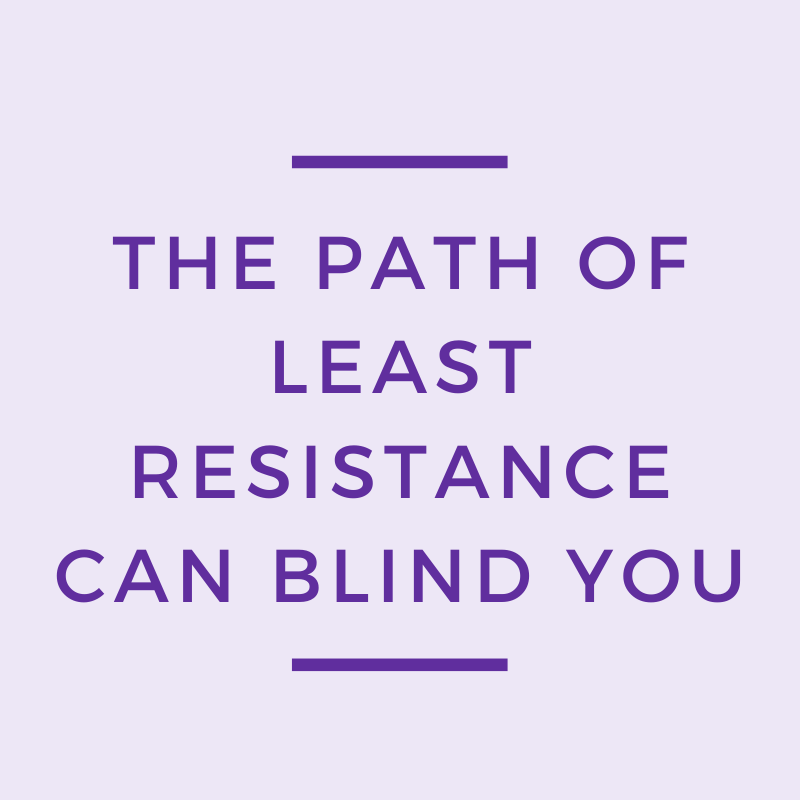We are in stress right now. All of us. It’s a rare moment in history where everyone on the planet is a state of communal stress.
Our coping mechanisms change when we experience stress. We go to what’s easy, what’s simple, what requires the least amount of energy.
We go for the path of least resistance.
The path of least resistance makes men and rivers crooked, to paraphrase Thoreau.
The Enneagram gives us a little navigational prediction to which river bend you take in times of stress. There’s a branch of that river that isn’t always talked about—the blind spot path.
When you float down this path, you don’t change your core number, but you naturally grab the unhealthy behaviors of another number. These behaviors are warning signs that you are slipping into unhealthy practices because you are trying to get your needs met.
And of course you are! Many of our basic needs feel threatened right now: security, resources, health, belonging. When we’re fighting for those things, of course it’s a whole lot easier to ride down the crooked river!
The blind spot path often goes unnoticed because it’s the one that comes up with your family or closest friends. And how many of you are now with your family more than you’ve been in ages?! And you’re stressed?
Well, howdy, blind spot path! I didn’t see you there.
How do you keep from being swept away on this unruly tributary?
Here are signs each number is headed down the blind spot path and practices to paddle a different direction instead.
Body Triad:
Coping with the emotional struggle of anger.
Eights:
- Inserting yourself into everyone’s business to protect everyone, usually without asking.
- Clinging to family and close friends, overly dependent on their approval and appreciation.
- Behaving as an angry martyr.
- Make yourself needed to those around you.
Try instead:
- See yourself as an empathetic servant. Giving to love, not to get.
- Reveal how you feel, being vulnerable by asking for what you need.
- Create space for others to tell you, “No, thank you.”
Nines:
- Telling others of your significance and value.
- Doing random busywork. Not what needs to be done.
- Wanting to brag about your achievements.
- Becoming angry with people pointing out your mistakes or faults
Try instead:
- Discover your own passion, even if it’s not affirmed by others.
- Stick to a prioritized plan.
- Allow helpful critique to inform your growth.
Ones:
- Behaving overly silly and, at times, reckless in a way that is almost manic.
- Become more demanding and self-focused.
- Finding unhealthy excesses to escape your inner critic.
- Doing things that don’t align with your values.
Try instead:
- Find peaceful joy in the little things.
- Extend grace to others who don’t do it your way.
- Observe and withhold judgement for both thinking and feeling.
Heart Triad:
Coping with the emotional struggle of shame.
Twos:
- Behaving in moody and overly emotional ways.
- Indulging yourself in unhealthy treats or behaviors. “I deserve it.”
- Feeling like you are missing something others have right now.
- Wallowing in negative emotions and disappointments.
Try instead:
- Take care of your needs, not just indulging yourself.
- Feel and process the negative emotions by naming them and rating them.
- Know you have what you need to love yourself and others.
Threes:
- Sharing how you feel anxious and frustrated in unhelpful ways.
- Venting about all the things you think are wrong, dreadful, or angering.
- Being suspicious and untrusting.
- Lashing out or reacting when feeling blamed.
Try instead:
- Express your feelings without having to achieve anything.
- Cooperate as a team player, trusting those around you.
- Relax knowing your worth isn’t in what you achieve or get done.
Fours:
- Seeing all the things that are wrong, in others, in your environment, in your world and judging it all, but doing unproductive things.
- Developing a little internal critic that is telling you your imperfections.
- Displaying your disappointment and annoyance with all the things.
- Behaving impatiently and controlling. Overly nitpicky.
Try instead:
- Find objective and balanced ways to feel and express your emotions and recognize the emotions of others.
- Focus on one task to complete that helps you and others in your home.
- Make the mundane tasks of living at home enjoyable to accomplish.
Head Triad:
Coping with the emotional struggle of fear.
Fives:
- Becoming confrontational and argumentative.
- Debating facts and outcomes forcefully and arrogantly.
- Becoming angry and aggressive when feeling betrayed or attacked.
- Questioning the competency of others in authority. Believe you know better.
Try instead:
- Pause and offer wisdom, not just information.
- Connect with your feelings and body to spur you toward action.
- Connect with others to bring help and hope.
Sixes:
- Shutting down.
- Avoiding confrontations with side comments and passive-aggressive behavior.
- Finding it hard to adjust routine.
- Acting out when people interrupt or disturb you.
Try instead:
- See others’ frustration and pain too. Choose compassion.
- Slow your mind enough to trust your inner gut.
- Know you are safe and secure. Help others feel that way too.
Sevens:
- Withdrawing away from family to get some energy.
- Experiencing pessimistic and cynical thoughts.
- Finding being positive wearying and exhausting.
- Becoming greedy of your own resources.
Try instead:
- Discipline yourself to have a routine.
- Accept that this is time is hard and sad.
- Know you have enough and can share with others, your time, and your resources.
Yes, it’s more challenging.

COMMENTs:
0